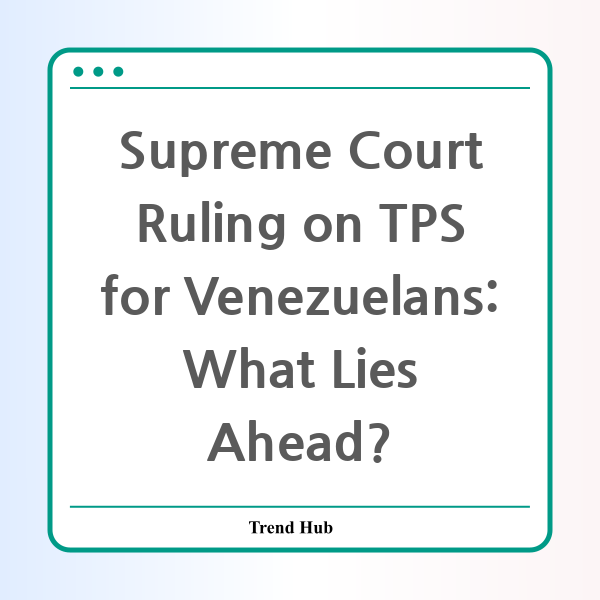* This website participates in the Amazon Affiliate Program and earns from qualifying purchases.

In a significant turn of events, the Supreme Court has recently ruled in favor of the Trump administration's decision to revoke Temporary Protected Status (TPS) for thousands of Venezuelan immigrants. This ruling raises crucial questions about the future of Venezuelan asylum seekers in the United States as well as the broader implications for immigration policy.
As many are aware, TPS is a program that provides temporary legal status to individuals from countries facing ongoing conflict, natural disasters, or other extraordinary conditions. Originally established in 1990, it has served as a lifeline for those seeking refuge. In March 2021, the Biden administration extended TPS for Venezuelans, a decision that affected over 300,000 individuals facing political instability and economic hardship in their home country. However, the recent Supreme Court ruling has opened the door for the Trump administration to potentially reverse this protection, leaving countless families in a state of uncertainty.
The Supreme Court's decision came as a response to an emergency application filed by the Trump administration, which argued that previous court rulings improperly limited executive discretion in immigration policy. The court's approval allows movement towards deportation for those currently benefitting from TPS, and the timing is critical, with protections set to expire soon. Justice Ketanji Brown Jackson's dissent on the application highlights the complexities and potential injustices involved in this unfolding legal battle.
For affected Venezuelans, the implications are dire. The U.S. District Judge Edward Chen expressed concerns over the administration's motives, citing racial animus and emphasizing the risk of imminent deportation to a country with grave safety issues. The chilling reality is that many Venezuelans currently with legal status may soon find themselves without any protection, potentially losing their jobs and facing removal to dangerous conditions back home.
Compounding this uncertainty is the recent position taken by Homeland Security Secretary Kristi Noem. Her decision to try and unwind TPS protections, previously extended under Biden, not only raises ethical questions but also puts immense pressure on families relying on this legal status for their livelihood. The growing legal fight illustrates a significant clash between executive power and judicial authority in managing immigration policies.
As the National TPS Alliance and various legal advocates challenge this move in court, they argue that the Trump administration is seeking to avoid judicial scrutiny of its actions. It is crucial for federal courts to provide checks and balances on the executive branch, especially in matters as sensitive as immigration.
In conclusion, the Supreme Court's ruling regarding the revocation of TPS for Venezuelans not only sets a precedent for immigration policy but also impacts the lives of many individuals and families caught in the crossfire of political decisions. As the legal battles continue, the future remains precarious for those seeking refuge and a stable life in the United States. It's a time for advocates, lawmakers, and concerned citizens to rally and push for fair immigration policies that reflect humanitarian principles and the values we stand for as a nation.
* This website participates in the Amazon Affiliate Program and earns from qualifying purchases.